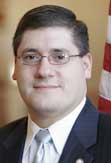Georgia is still battling the worst financial crisis since the Great Depression. Our schools have felt the negative effects with budget cuts, furloughs, and teacher layoffs.
The General Assembly succeeded in reducing government spending by approximately $4 billion the last several years, making targeted cuts to balance the state budget while protecting core services. Every possible resource was utilized, and now enhanced methods must be employed to dig deeper into budgets to identify and eliminate potential waste to help ease the taxpayer burden.
The 2010 General Assembly needed to act on these two critical areas in our state and we did, approving three key pieces of legislation aimed at improving education and protecting taxpayers from wasteful government spending with increased transparency.
Much to the disappointment of many lawmakers, Governor Perdue vetoed these three bills on the final day bills could be signed into law.
All three bills received final passage in the House and Senate with bi-partisan support. These measures provided school systems much-needed financial support in times of massive teacher layoffs and brought greater accountability to our state budget, exactly the remedy needed during these terrible economic times.
We can respect the position of the governor, but legislators must unite and support a veto override of these important, common-sense bills when we convene for the 2011 General Assembly in January:
- We passed a new education statue guaranteeing middle school state funds to school districts regardless of how they organize their middle school grade levels. This way, systems can place their students in the optimal setting for their needs and still have access to money they need to retain good teachers and avoid future furloughs and/or layoffs for the sake of their students. The governor objected to an amendment added which would improve how the Special Needs Scholarship is disbursed. The added language would only change the procedure, not the amount awarded.
- The Zero-Based Budget (ZBB) Act is a measure designed to increase efficiencies and decrease wasteful spending. It requires one-quarter of the budget to be rebuilt each year, so that every four years the entire state budget will be analyzed and lawmakers can scrutinize every dollar of taxpayer money being spent to ensure it is being used properly and effectively. A veto order was passed over worry ZBB would conflict with the executive branch’s role in the budget process.
- The Legislative Sunset Commission Act allows lawmakers to review every state agency and department to identify areas of ineffectiveness, duplication or services simply no longer needed then fix it with consolidation, merging departments or elimination. This bill gives lawmakers a powerful tool to identify and eliminate additional waste. As with the ZBB veto, his bill posed potential issues over who was in charge of the budget decisions.
Instead of passing effective solutions to aid our hurting schools immediately and help us better manage taxpayer dollars during a massive economic crisis, concerns over bureaucratic procedures halted getting these solutions into law. Georgians needed help and the General Assembly responded, trying to spare schools and the bleeding state budget from additional pain.
Now the House and Senate must come through again by overriding these vetoes in January and making these measures law.
Everyone should contact their elected officials and make sure your voice is heard about getting these common-sense, bi-partisan measures placed into law. As public servants, we must draw a line in the sand and say YES to support the bedrock principles that embody the fiscally-responsible government Georgia must continue to maintain.
###
State Rep. David Casas represents the 103rd House District which includes a portion of Gwinnett County. He was elected into the House of Representatives in 2002, and is currently the Vice Chairman of the Economic Development & Tourism Committee. He also serves on the Appropriations, Education, and Rules committees.